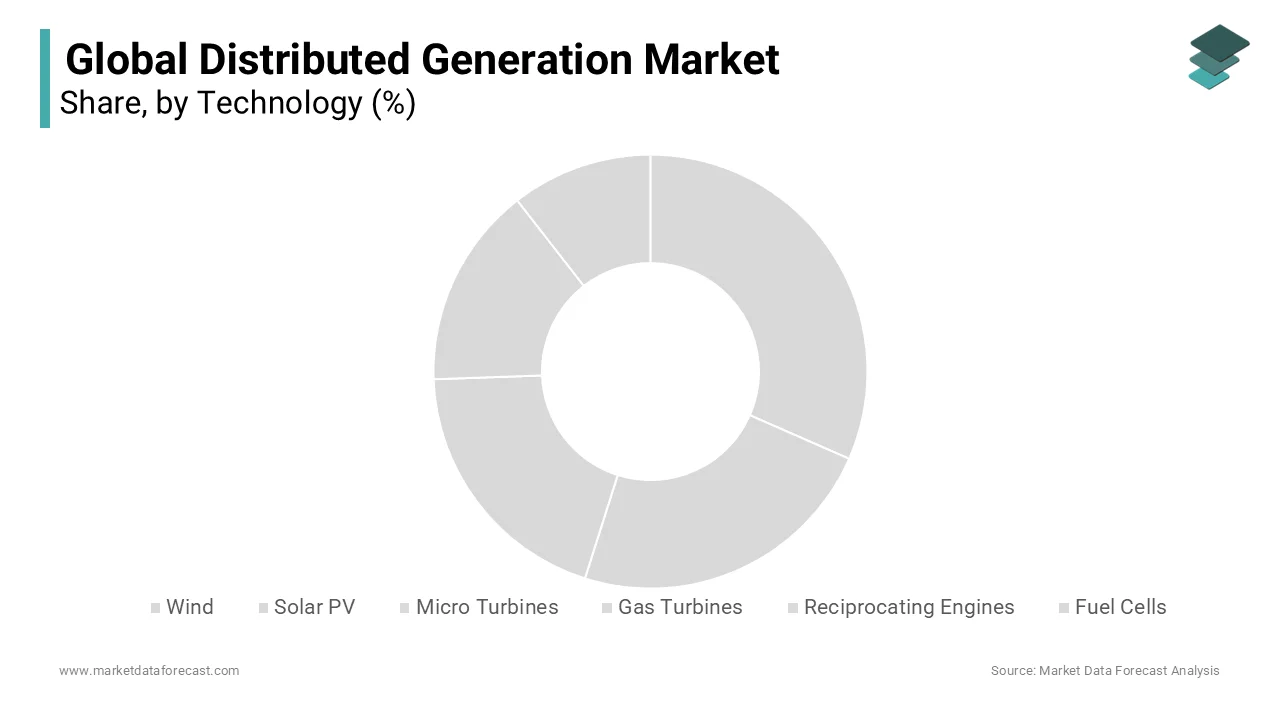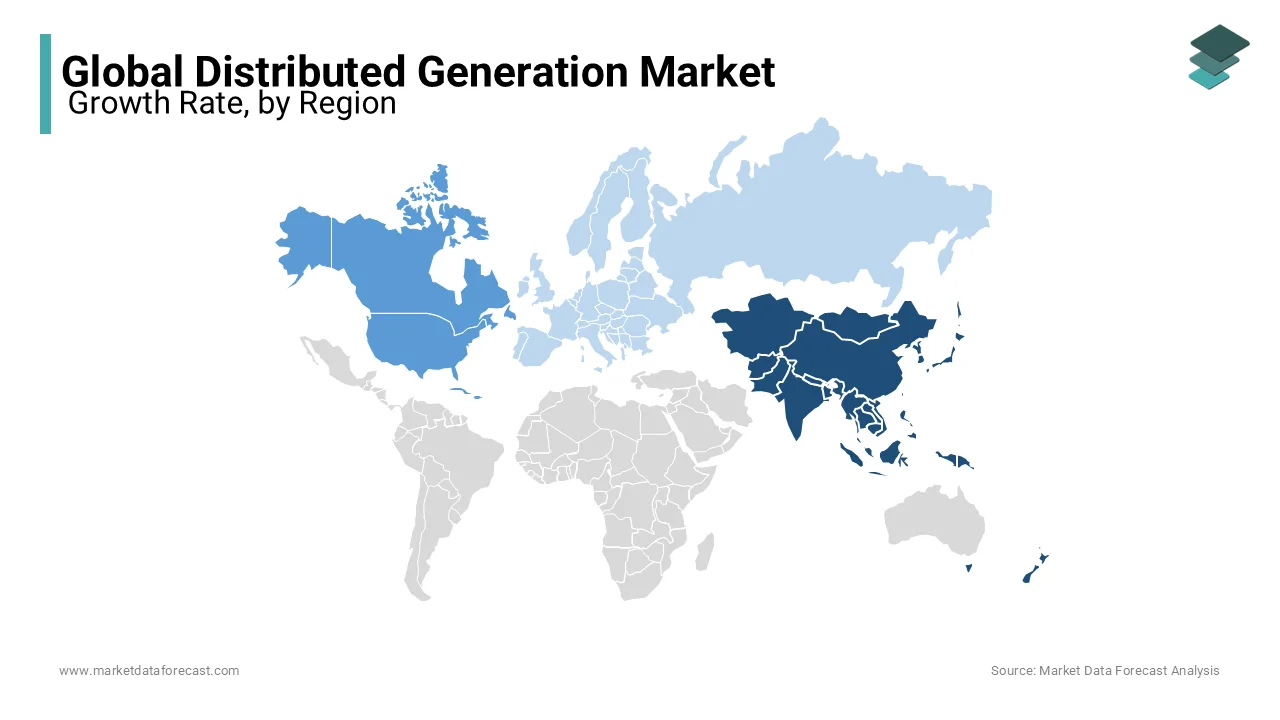Global Distributed Generation Market Size, Share, Trends, & Growth Forecast Report – Segmented By Technology (Reciprocating Engines, Fuel Cells, Solar PV Cells, Gas & Steam Turbines, and Wind Turbines), By Application (Residential, Commercial, and Industrial) & Region - Industry Forecast From 2024 to 2032
Global Distributed Generation Market Size (2024 to 2032)
The Global Distributed Generation Market was worth USD 116.87 billion in 2023 and is anticipated to reach a valuation of USD 324.09 billion by 2032 from USD 130.89 billion in 2024 and register a CAGR of 12% during the forecast period.
Current Scenario of the Global Distributed Generation Market
The term distributed generation commonly known as decentralized generation or on-site generation results in the production of electricity for personal use on-site. It is usually generated using environmentally beneficial, pollution-free means, which include solar energy, wind energy, and other comparable techniques. It mostly excludes the energy transmission necessary for a large, centralized power-producing facility, such as a coal-fired or nuclear power plant, to produce electricity through the electric grid. It is now necessary to encourage distributed generators to reduce and manage centralized power loads because global power consumption has significantly increased due to commercial, industrial, and residential applications. Furthermore, the majority of the developing world still lacks adequate power supplies which results in the need for distributed, environmentally friendly electricity generation.
The distributed generation market growth has been increasing as consumer awareness of clean energy sources increases. The market is also being driven by the rising demand for a distributed generation due to its advantages over conventional energy generation in terms of cost and the environment. Moreover, the demand for distributed generation systems and the growth of the global distributed generation market are being fueled by technical advancements, innovations, and ease of use.
MARKET DRIVERS
The primary factor that drives the global distributed generation market share in the upcoming years is the rising government regulations and goals for reducing greenhouse gas (GHG) emissions.
Because of the advantages of renewable technology, such as energy security, resiliency, and carbon reductions, several states and municipal governments are developing policies to encourage the increased deployment of renewable technologies. Moreover, increased R&D efforts for the implementation of new technologies are also anticipated to fuel market expansion. DEG systems are also less expensive than conventional power generation methods. As a result, the demand for a clean source of energy and the affordability of the products are anticipated to enhance the global distributed generation market expansion during 2024-2032. These are a few of the distributed energy generation market trends.
On the other hand, distribution generation technology is primarily been utilized since it is cheaper than traditional generation systems and is much more affordable, which also acts as the major driver for the global distributed generation market growth in the upcoming years.
The global distributed generation market volume is being boosted by the growing government initiatives and policies to limit the emission of greenhouse gases as well as the expanding use of green energy. Favourable guidelines for the use of renewable energy sources are being implemented by many state and municipal governments, which is fueling the global distributed generation industry. Additionally, it is anticipated that increased investments in research and the development of new technologies for distributed generation will benefit the market in the future.
Demand for distributed energy is being fueled by distributed generation's capacity to meet a specific residential or commercial unit's energy needs. The demand for distributed generation is primarily propelled by the growing need for an uninterrupted and effective power supply along with the growing government initiatives and policies to limit the emission of greenhouse gases as well as the expanding use of green energy.
MARKET RESTRAINTS
The primary factor that is hampering the global distributed generation market growth is the reluctance to spend on distributed generation. Moreover, the islanding in power systems, grid functionality, system balance, and the intermittent and variable nature of sources like wind and solar also act as the global distributed generation market restraints during the forecast period.
REPORT COVERAGE
|
REPORT METRIC |
DETAILS |
|
Market Size Available |
2023 to 2032 |
|
Base Year |
2023 |
|
Forecast Period |
2024 to 2032 |
|
CAGR |
12% |
|
Segments Covered |
By Technology, Application, and Region. |
|
Various Analyses Covered |
Global, Regional & Country Level Analysis, Segment-Level Analysis, DROC, PESTLE Analysis, Porter’s Five Forces Analysis, Competitive Landscape, Analyst Overview of Investment Opportunities |
|
Regions Covered |
North America, Europe, APAC, Latin America, Middle East & Africa |
|
Market Leaders Profiled |
Vestas, CATERPILLAR, Capstone Green Energy Corporation, Doosan Heavy Industries & Construction, Toyota Tsusho Corporation, Rolls-Royce plc, General Electric, Mitsubishi Electric Corporation, Schneider Electric, Siemens, and Others. |
SEGMENTAL ANALYSIS
Global Distributed Generation Market Analysis By Technology

Among these technologies, the fuel cell category dominated the global distributed generation market in terms of technology with a market share of more than 38% in 2023. The expansion of this market has been aided by the rising use of fuel cells in distributed generation systems due to its many advantages, including high efficiency, minimal emissions, and the capacity to transform chemical energy into electrical energy. The fuel cell segment is primarily driven by the fuel cells' 60% higher efficiency.
On the other hand, it is anticipated that the solar PV segment will have the fastest growth in the globally distributed generation market during the forecast period. The demand for the solar PV distributed generation industry has risen as a result of government incentives for the use of solar energy and falling prices for solar equipment during the past few years. Additionally, due to increased efforts by the government and businesses to minimize their carbon footprint and attain sustainability over the long term, the majority of industries are moving toward the use of solar energy sources.
Global Distributed Generation Market Analysis By Application
Based on end users, the commercial & industrial sectors dominated the global distributed generation market with a market share of almost 73% in 2023. Because of the increased government efforts, including incentives and subsidies, to encourage the use of renewable energy sources in the commercial and industrial sectors. Furthermore, this market has expanded as a result of falling equipment costs and the rising need for reliable power. Additionally, the government's increased attempts to industrialize and urbanize rural areas are the major drivers of the segment’s growth, and as a result, this segment is anticipated to dominate during 2024-2032.
On the other hand, the residential category is anticipated to have the fastest CAGR during the projected period. The growth of major residential complexes and the rapid urbanization of rural areas are the two key factors fueling the residential segment's growth. As distributed generating systems are utilized more frequently for tasks like heating, ventilation, cooling, and cooking, demand in the residential sector is expected to rise.
REGIONAL ANALYSIS

Asia Pacific region is dominating the global market for distributed generation with a share of 45% because of the rising investments in industrialization and urbanization, rising investments in infrastructure development, and rising government programs to promote the deployment of renewable, green, and clean energy sources. Additionally, as industrialization progresses, there is an increased need for a reliable, efficient power supply, which is boosting the distributed generation market in the Asia Pacific.
During the projection period, North America is anticipated to have significant global distributed generation market growth. It is anticipated that the demand for distributed generation technologies will be fueled by the enormous demand for wind energy in North America and the quickly expanding need for solar energy across commercial and industrial units.
The product demand in Europe is largely utilized by Germany and Italy. The regional market is expected to see a rapid rise in demand for solar PV and wind turbines as a result of increased renewable energy objectives and a number of government-set favourable policies.
KEY PLAYERS IN THE GLOBAL DISTRIBUTED GENERATION MARKET
Companies playing a prominent role in the global distributed generation market include Vestas, CATERPILLAR, Capstone Green Energy Corporation, Doosan Heavy Industries & Construction, Toyota Tsusho Corporation, Rolls-Royce plc, General Electric, Mitsubishi Electric Corporation, Schneider Electric, Siemens, and Others.
RECENT HAPPENINGS IN THE GLOBAL DISTRIBUTED GENERATION MARKET
- Schneider Electric, European energy, and automation firm purchased the electrical and automation branch of Larsen & Turbo (L&T) in September 2020.
- The joint venture between Mitsubishi Heavy Industries Ltd. of Japan and Vestas Wind Systems A/S of Denmark was officially dissolved by an agreement signed in December 2020.
DETAILED SEGMENTATION OF THE GLOBAL DISTRIBUTED GENERATION MARKET INCLUDED IN THIS REPORT
This research report on the global distributed generation market has been segmented and sub-segmented based on technology, application, and region.
By Technology
- Wind
- Solar PV
- Micro Turbines
- Gas Turbines
- Reciprocating Engines
- Fuel Cells
By Application
- Commercial
- Industrial
- Residential
By Region
- North America
- Europe
- Asia Pacific
- Latin America
- Middle East & Africa
Frequently Asked Questions
What can be the total Distributed Generation market value?
The Global Distributed Generation Market was worth USD 116.87 billion in 2023 and is anticipated to reach a valuation of USD 324.09 billion by 2032.
Mention the market which has the largest share in the Distributed Generation market?
Asia Pacific region is expected to have the largest market share of the global Distributed Generation market.
Name any three Distributed Generation market key players?
Toyota Tsusho Corporation, Rolls-Royce plc, and General Electric are the three Distributed Generation key players.
What is the major effecting factor in the global Distributed Generation market?
Rising government regulations and goals for reducing greenhouse gas (GHG) emissions will propel the market for distributed energy generation to expand.
Mention the latest trend in the global Distributed Generation market?
The global Distributed Generation market is seeing an increase in the use of Distributed Generation in the industrial and commercial sector.
Related Reports
Access the study in MULTIPLE FORMATS
Purchase options starting from $ 2500
Didn’t find what you’re looking for?
TALK TO OUR ANALYST TEAM
Need something within your budget?
NO WORRIES! WE GOT YOU COVERED!
Call us on: +1 888 702 9696 (U.S Toll Free)
Write to us: [email protected]
